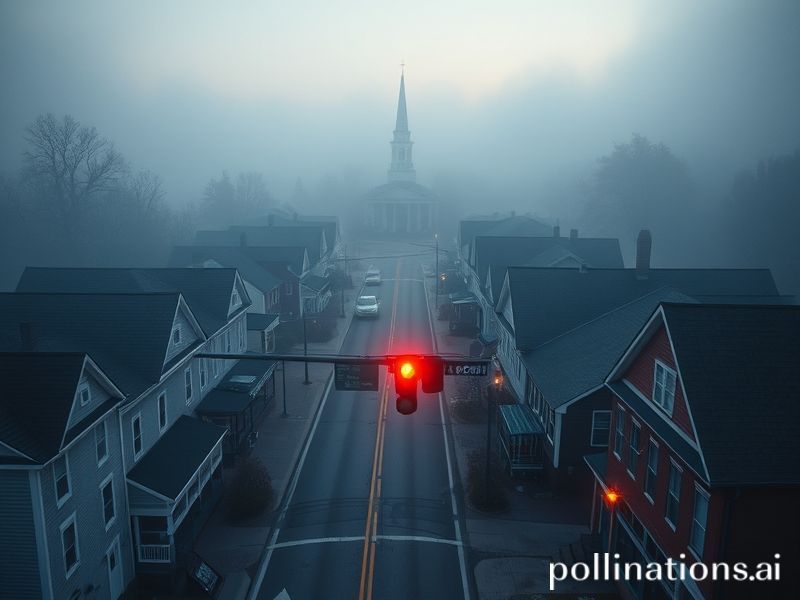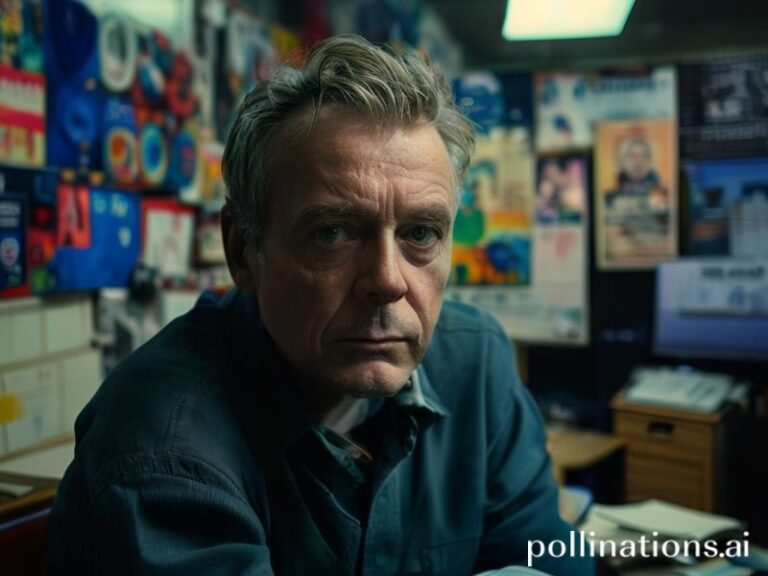The Town That Accidentally Became the World’s Laboratory for Late-Stage Capitalism
The Town That Forgot It Was Global
By Our Correspondent in the Only Time Zone That Really Matters
Somewhere between the last nonstop flight to Dubai and the first drone-delivery of oat milk, a dot on the map began behaving like it mattered. The locals call it “the town,” as though every other municipality on Earth is merely a rehearsal. The rest of us, hunched over glowing rectangles in airport lounges from Lisbon to Lombok, are expected to keep tabs on the place because—apparently—its zoning disputes now constitute a leading economic indicator. The IMF, never a group to miss a free buffet, has dispatched a working group; the World Bank, always eager to brand a crisis, is already printing glossy brochures featuring smiling children and solar panels.
From a distance, the town resembles every other postcard village that discovered globalization at gunpoint: a medieval church repurposed as a co-working space, artisanal bakeries that accept Bitcoin, and a mayor who moonlights as an NFT evangelist. Yet beneath the curated rustic charm lurks the same neurosis that keeps Davos awake at night—namely, the fear that someone, somewhere, is building a better Wi-Fi network. The town’s council, in a fit of performative futurism, has declared itself a “smart city pilot.” Translation: they installed three traffic sensors and an app that pings you when the compost bin is full. Investors from Singapore to Silicon Valley swooned. Venture capital, like influenza, spreads fastest in crowded places with poor ventilation.
International implications? Oh, they abound. When the town voted to rename the main square “Blockchain Plaza,” the Chinese ambassador issued a stern communiqué about “cultural decolonization of digital nomenclature,” thus proving that geopolitical indignation can indeed be outsourced. Meanwhile, El Salvador’s president—never one to let a bandwagon pass unjumped—announced sister-city status and promised volcano-powered Bitcoin mines. The Swiss, scandalized by such exuberance, dispatched a fact-finding mission that will, after eighteen months and CHF 4.2 million, conclude that clocks remain useful.
Economists, those modern court jestlers, insist the town is a petri dish for post-national capitalism. They point to its micro-currency, the “Townie,” which fluctuates according to the mood of the local sourdough starter. (Yesterday it dipped 3% after the baker admitted he’d played Nickelback during fermentation.) The Bank for International Settlements, headquartered conveniently far away, has issued a white paper titled “Yeast-Based Monetary Transmission: Risks and Opportunities.” It runs to 94 pages and contains the phrase “liquidity crouton.”
Of course, every laboratory needs its control group. Across the river, the rival village—still clinging to barter and suspicion—has become a UNESCO Intangible Cultural Heritage site for “authentic pre-digital sulkiness.” Tourists pay in euros to watch residents scowl at smartphones they refuse to own. The irony, thick enough to butter, is that the town’s brand-new 5G tower stands just close enough to leak signal into the heritage zone, creating a shadow market of teenagers huddled in bushes, live-streaming their elders’ technophobia.
And what of the town’s own residents, those involuntary protagonists in humanity’s pilot episode? They wake each morning to find another multinational has erected a pop-up concept store selling artisanal oxygen. Rents have risen faster than the sea levels they pretend aren’t lapping at the postcard edges. The local pub, once a reliable refuge for existential dread, now hosts nightly “Web3 Karaoke,” where you mint an NFT of your off-key rendition of “Zombie” by The Cranberries. The barman, a philosopher in a former life, mutters that even Orwell lacked imagination.
Yet for all the absurdities, the town remains instructive. It shows how quickly the global elite will gentrify even the apocalypse, spray-painting it millennial pink and calling it disruption. It proves that when the history of late capitalism is written, the index will contain more footnotes to sourdough than to social justice. And it reminds us that every village square, no matter how small, can become the world’s stage—provided the Wi-Fi is strong and the branding is stronger.
So keep an eye on the town. Its next municipal council meeting—live-streamed, naturally—will debate whether to secede from the nation-state and join the metaverse instead. The vote, according to leaked polls, is too close to call. But the smart money, ever the optimist, has already priced in a landslide. After all, in the global village, even the village idiots have passports.







